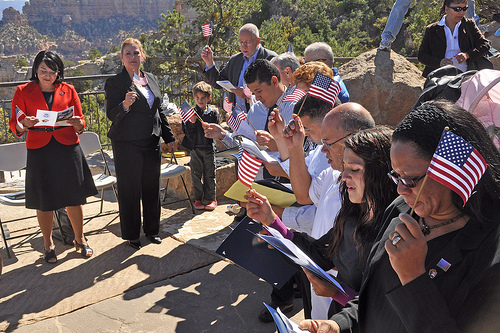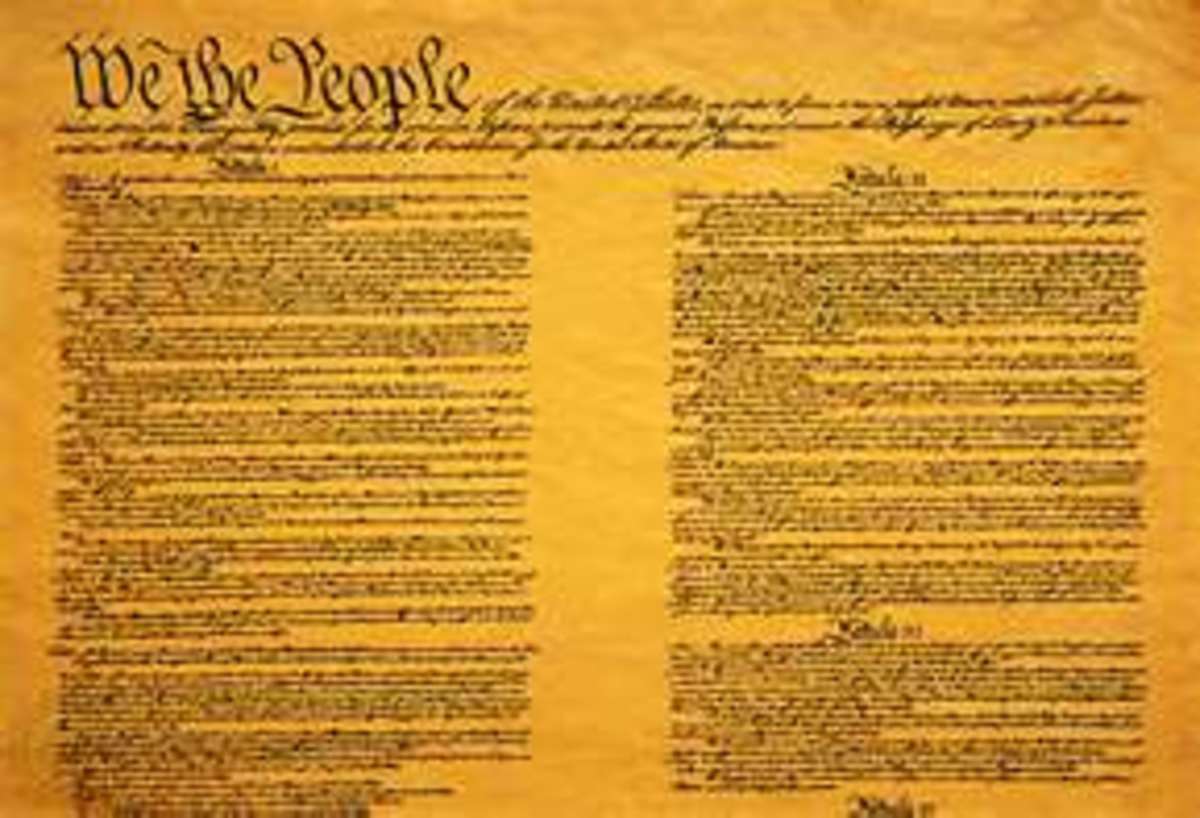How to become a U.S. citizen

What every American needs
After I was adopted I didn't become a U.S. citizen until several years later. My parents filled out the paperwork and submitted it, but due to the influx of immigrants and other issues in the citizenship office my naturalization had been delayed. When I was twelve years old, I was taken to the Bureau of Immigration and Naturalization Services in San Francisco to be naturalized.
In a way this was positive, however, because I became a citizen at an age when I was aware of what was going on and I could understand the importance of what was occurring. Going through the process at so late an age rather than in infancy, I was capable of recalling the details of the process
Patriotism is something I share with many Americans, but that was enhanced in me through an event most do not experience. As the majority are bestowed citizenship at birth, it is generally taken for granted. Having actually experienced my naturalization has helped me realize how fortunate I am to be American. Living in the United States before being naturalized has allowed me to see the life I might not have lived and the privileges I might not have had. In this period of complication for my country as well as the rest of the world, having this satisfaction and pride means a lot to me.
Becoming a citizen meant a lot to me and I think everyone should have the opportunity to. Below are guidelines to fulfill this process.

Requirements to be a citizen
Age
Applicants must be at least 18 years old.
Residency
An applicant must have been lawfully admitted to the United States for permanent residence. Lawfully admitted for permanent residence means having been legally accorded the privilege of residing permanently in the United States as an immigrant in accordance with the immigration laws. Individuals who have been lawfully admitted as permanent residents will be asked to produce an I-551, Alien Registration Receipt Card, as proof of their status.
Residence and Physical Presence
An applicant is eligible to file if, immediately preceding the filing of the application, he or she:
- has been lawfully admitted for permanent residence;
- has resided continuously as a lawful permanent resident in the U.S. for at least 5 years prior to filing with absences from the United States totaling no more than one year;
- has been physically present in the United States for at least 30 months out of the previous five years (absences of more than six months but less than one year break the continuity of residence unless the applicant can establish that he or she did not abandon his or her residence during such period);
- has resided within a state or district for at least three months.
Good Moral Character
Generally, an applicant must show that he or she has been a person of good moral character for the statutory period (typically five years or three years if married to a U.S. citizen or one year for Armed Forces expedite) prior to filing for naturalization. The Service is not limited to the statutory period in determining whether an applicant has established good moral character. An applicant is permanently barred from naturalization if he or she has ever been convicted of murder. An applicant is also permanently barred from naturalization if he or she has been convicted of an aggravated felony as defined in section 101(a)(43) of the Act on or after November 29, 1990. A person also cannot be found to be a person of good moral character if during the last five years he or she:
- has committed and been convicted of any controlled substance law, except for a single offense of simple possession of 30 grams or less of marijuana
- has committed and been convicted of one or more crimes involving moral turpitude
- has committed and been convicted of 2 or more offenses for which the total sentence imposed was 5 years or more
- has been confined to a penal institution during the statutory period, as a result of a conviction, for an aggregate period of 180 days or more
- has committed and been convicted of two or more gambling offenses
- is or has earned his or her principle income from illegal gambling
- is or has been involved in prostitution or commercialized vice
- is or has been involved in smuggling illegal aliens into the United States
- is or has been a habitual drunkard
- is practicing or has practiced polygamy
- has willfully failed or refused to support dependents
- has given false testimony, under oath, in order to receive a benefit under the Immigration and Nationality Act.
An applicant must disclose all relevant facts to the Service, including his or her entire criminal history, regardless of whether the criminal history disqualifies the applicant under the enumerated provisions.
Attachment to the Constitution
An applicant must show that he or she is attached to the principles of the Constitution of the United States.
Language
Applicants for naturalization must be able to read, write, speak, and understand words in ordinary usage in the English language. Applicants exempt from this requirement are those who on the date of filing:
- have been residing in the United States subsequent to a lawful admission for permanent residence for at least 15 years and are over 55 years of age;
- have been residing in the United States subsequent to a lawful admission for permanent residence for at least 20 years and are over 50 years of age; or
- have a medically determinable physical or mental impairment, where the impairment affects the applicant’s ability to learn English.
United States Government and History Knowledge
An applicant for naturalization must demonstrate a knowledge and understanding of the fundamentals of the history and of the principles and form of government of the United States. Applicants exempt from this requirement are those who, on the date of filing, have a medically determinable physical or mental impairment, where the impairment affects the applicant’s ability to learn U.S. History and Government.
Applicants who have been residing in the U.S. subsequent to a lawful admission for permanent residence for at least 20 years and are over the age of 65 will be afforded special consideration in satisfying this requirement.
Oath of Allegiance
To become a citizen, one must take the oath of allegiance. By doing so, an applicant swears to:
- support the Constitution and obey the laws of the U.S.;
- renounce any foreign allegiance and/or foreign title; and
- bear arms for the Armed Forces of the U.S. or perform services for the government of the U.S. when required.
In certain instances, where the applicant establishes that he or she is opposed to any type of service in armed forces based on religious teaching or belief, USCIS will permit these applicants to take a modified oath.
Spouses of U.S. Citizens
Generally, certain lawful permanent residents married to a U.S. citizen may file for naturalization after residing continuously in the United States for three years if immediately preceding the filing of the application:
- the applicant has been married to and living in a valid marital union with the same U.S. citizen spouse for all three years;
- the U.S. spouse has been a citizen for all three years and meets all physical presence and residence requirements; and
- the applicant meets all other naturalization requirements.
There are also exceptions for lawful permanent residents married to U.S. citizens stationed or employed abroad. Some lawful permanent residents may not have to comply with the residence or physical presence requirements when the U.S. citizen spouse is employed by one of the following:
- the U.S. Government (including the U.S. Armed Forces);
- American research institutes recognized by the Attorney General;
- recognized U.S. religious organizations;
- U.S. research institutions;
- an American firm engaged in the development of foreign trade and commerce of the United States; or
- certain public international organizations involving the United States.
Veterans of U.S. Armed Forces
Certain applicants who have served in the U.S. Armed Forces are eligible to file for naturalization based on current or prior U.S. military service. Such applicants should file the N-400 Military Naturalization Packet.
Lawful Permanent Residents with Three Years U.S. Military Service
An applicant who has served for three years in the U.S. military and who is a lawful permanent resident is excused from any specific period of required residence, period of residence in any specific place, or physical presence within the United States if an application for naturalization is filed while the applicant is still serving or within six months of an honorable discharge.
To be eligible for these exemptions, an applicant must:- have served honorably or separated under honorable conditions;
- completed three years or more of military service;
- be a legal permanent resident at the time of his or her examination on the application; or
- establish good moral character if service was discontinuous or not honorable.
Applicants who file for naturalization more than six months after termination of three years of service in the U.S. military may count any periods of honorable service as residence and physical presence in the United States.
An applicant who has served honorably during any of the following periods of conflict is entitled to certain considerations:
World War I - 4/16/17 to 11/11/18;
World War II - 9/1/39 to 12/31/46; Korean Conflict - 6/25/50 to 7/1/55; Vietnam Conflict - 2/28/61 to 10/15/78; Operation Desert Shield/ Desert Storm - 8/29/90 to 4/11/91; or any other period which the President, by Executive Order, has designated as a period in which the Armed Forces of the United States are or were engaged in military operations involving armed conflict with hostile foreign forces.Applicants who have served during any of the aforementioned conflicts may apply for naturalization based on military service after qualifying service and the requirements for specific periods of physical presence in the United States and residence in the United States are waived.

The naturalization process
The naturalization process takes time. The swearing-in ceremony for receiving the naturalization certificate will take place from 1 to 180 days after the interview, although in a few U.S. of Citizenship and Immigration Services (formerly known as the INS) district offices, it can take another 1 or 2 years.
The time length depends on the number of applications the U.S. of Citizenship and Immigration Services (formerly known as the INS) offices have in different states from people who want to become citizen. Making a mistake on your application can cast you even more time. However, using our unique services will assist you throughout the entire process—producing a flawless application. When you follow our expert advice on how to become a U.S. citizen, you can be absolutely sure that everything was filled out correctly the first time.
Getting photographed and submitting your application
- Complete your application to become a U.S. citizen using the USCitizenship.info system
- Get two professional passport photographs taken of yourself
- Collect all the documents described in the instructions given to you by our system. Make sure all documents provided by USCitizenship.info are completed to ensure that the naturalization process goes smoothly with no interruptions.
Getting Fingerprinted
- Receive an appointment letter from the U.S. Citizenship and Immigration Services (formerly known as the INS)
- Go to the fingerprinting location specified on the letter
- Get your fingerprints taken
- Mail any additional documents to the U.S. Citizenship and Immigration Services (formerly known as the INS) if requested, along with your application
- Wait for US Citizenship and Immigration Services (formerly known as the INS) to schedule your interview
Being Interviewed
- Receive an appointment for your interview from the U.S. Citizenship and Immigration Services (formerly known as the INS)
- Go to your local office at the specified time
- Bring identification and provide any additional documents the U.S. Citizenship and Immigration Services (formerly known as the INS) has requested of you
- Answer questions about your application and background
- Take the English and civics tests (You will receive 100 FREE sample questions with answers when you purchase our service!)
- Receive a decision from the U.S. Citizenship and Immigration Services
Taking the Oath
- Receive a ceremony date from the U.S. Citizenship and Immigration Services (formerly known as the INS)
- Check in at the ceremony
- Return your permanent resident card
- Answer questions about what you have done since your interview
- Take the naturalization oath
- Receive your Certificate of Naturalization
US citizenship ceremony

On a personal note
Part of the process, if you're over 18, is taking the citizenship exam. Since I was under 18 I didn't have to take that exam but I heard that it was difficult and that many of the questions are so hard that citizens by birth cannot pass the test. So study a lot! It will be worth it.
Also please note that it's not free to be naturalized. On USCitizenship.info they charge $99.95 plus INS fees for their basic formation service to help walk through the INS forms.
Just be patient with the process. The office has a lot to do so it may take time. In the end, however, the benefits of being an official American outweigh the wait.

Naturalization links
- US Immigration
Info on US citizenship, passports, visas, and green cards - USCitizenship.info
Apply for your citizenship online - USCIS - Naturalization Self Test
Sample questions
Sites Referenced
- Citizenship/Naturalization
- US Citizenship | Citizenship in America | Immigration and Naturalization Services
US Citizenship, citizenship in america, Try your luck with a green card. Immigration to the United States, procedures, conditions, instructions and much more - U S A Immigration Naturalization US Citizenship
Our law firm represents those seeking citizenship in the U.S. through naturalization, amnesty and asylum petitions - USCIS - Citizenship Through Naturalization
- U.S. Citizenship









